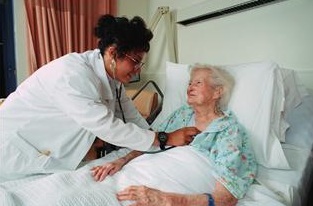It is so stressful when a loved one is hospitalized and there are so many worries for any family during this time, especially when helping an elderly loved one or someone with Alzheimer’s disease. There are a number of studies (and many families’ experiences) confirming the particular difficulties of hospitalization in elders with dementia/Alzheimers–check out Aging Wisely’s article on the latest dementia hospitalization statistics and tips for families.
Some of the most common hazards for elders when hospitalized include delirium, falls and medication errors. There are special precautions that should be taken for elder patients, especially those suffering from dementia/memory loss. It is important to watch for signs of delirium such as sudden change in mental status, inattention and altered level of consciousness. Whether due to confusion, weakness or medications, many people in the hospital are at risk for falls. A patient may be told to call for assistance before getting out of bed. Would your loved one remember this warning or heed it? What will happen if help is delayed in arriving and no one is there to seek out immediate help or assure the patient that help is on the way? Can your loved one accurately report current medications, allergies and side effects? Can he or she observe what is going on and ask questions if concerns arise?
These concerns and questions raise the possibility that your loved one should have someone by his or her side throughout the hospitalization. Typically, a patient can have a close family member staying at the hospital around-the-clock, except perhaps in situations where it is medically inadvisable. Check with hospital staff about their visitation policy. Many times the hospital staff will even suggest that someone be there, particularly in cases where a patient with dementia is unsafe alone or agitated/confused. The resource that can be a great help to you in this situation is a “hospital sitter”. This is the term given to Certified Nursing Assistants, Home Health Aides or other caregivers such as LPNs who are hired to provide senior caregiver support while a patient is in the hospital.
A hospital sitter can:
- Help relieve family caregivers by taking “shifts” such as staying overnight so you can get some rest while you stay with a loved one during the days and manage their care. This can also be a great help for long-distance caregivers who cannot be present or cannot arrive immediately.
- Observe changes or concerns and notify family members and medical professionals, which may help more rapidly diagnosis problems such as delirium, medication incidents and infections.
- Help oversee safety and ensure fall precautions are maintained. The hospital sitter can help call for further assistance, reassure your loved one when upset or waiting on help and remind the patient about precautionary measures.
- Provide companionship and stimulation and help with “the little things”. A sitter can read to your loved one, do puzzles or other games, chat and reminisce, or even just help work the TV remote to find a program your loved one will enjoy. The companionship can be a great comfort and relieve loneliness and anxiety. Knowing your loved one has the company of the sitter can also help relieve your anxiety and allow you to rest so you can be the best advocate and balance your multiple responsibilities. A hospital sitter can make sure your loved one has on her special robe or massage in some hand lotion, help make a phone call to a grandchild and other “little things” that mean a lot and can help the healing process.
- Maintain contact with family members and report in on how things are going, help be your “eyes and ears” and ensure that medical providers direct questions or information to you if your loved one may not be able to accurately report.
You can see from this short list of possible benefits how much a hospital sitter can help elders when hospitalized, especially those who have Alzheimer’s disease and other forms of dementia. Even a young person who is able to be his/her own advocate often needs an advocate or additional eyes and ears during a hospitalization. The patient’s role is first and foremost to get well, and your role as a family advocate and caregiver also requires that you rest and stay well.
How do you locate an appropriate hospital sitter?
Your hospital may maintain a list of home health agencies providing sitters in your local area as a starting point.
Most home health agencies provide services at home, in assisted living facilities and nursing homes as well as in hospitals. You can contact your local Area Agency on Aging or state licensing agency (such as Florida’s Agency for Healthcare Administration’s HealthFinder) for lists of licensed agencies (each state is different and some may not license “non-medical” care providers such as home care or senior companion agencies).
EasyLiving can provide hospital sitters to Pinellas and Hillsborough County hospitals in Florida, such as Morton Plant Hospital in Clearwater, Mease Dunedin and Mease Countryside, Largo Medical, Northside Hospital, St. Petersburg General, Tampa General and many more. We welcome your calls or website inquiries and we are here to help 24/7 if you have an urgent need! Reach us any time at 727-447-5845.
We hope this information helps if you should face a hospitalization in your family and we invite you to share!








